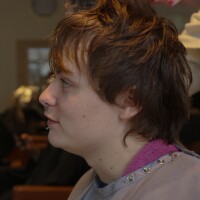Watch above: Experience stylist Angelina Fernandez giving Thomas Tolbert's his gender-affirming haircut. "Dude, I have never wanted to show off a haircut before in my life," he says. (Luis-Alfredo Garcia/WUFT News)
Thomas Tolbert lives alone, but he has a sense of community, uplifted through his journey by friends and Billie Jean, his inquisitive cat. Born female, the 19-year-old University of Florida sophomore knew he was a man at 17 and began hormone replacement therapy (HRT) at 18.
Then, Tolbert, an anthropology major from Altamonte Springs in Seminole County, had his HRT ripped away. Unable to afford surgery and required to ration his remaining vials of testosterone, he found another way to affirm his gender: a haircut.
Throughout his youth, Tolbert considered his hair one of his only feminine features; the radiant, blond hair ran down his back like streaks of sunlit honey. Almost every hair stylist he visited throughout his life told him how cute and coveted his hair was.
He, however, did not pine for this pinnacle of femininity. Every expedition to a hair salon made it evident that the gender he was perceived as did not mirror how he felt.
Gender-affirming care is a range of social, psychological, behavioral and medical interventions designed to support an individual’s gender identity, according to the Association of American Medical Colleges. Many transgender people pursue more costly measures such as surgery and HRT, but for others, smaller changes like clothing and hair also help affirm gender.

Tolbert is one of 111,100 transgender people living in Florida, according to the UCLA School of Law Williams Institute in Los Angeles.
A barrage of bills in 22 states have sought to limit access to gender-affirming care, making it so people who wish to transition have less options to do so. In most states, these bills solely target transgender youth. Two of the bills – in Louisiana and West Virginia – became law when 2024 began, but last week the Ohio Senate overruled Gov. Mike DeWine's veto of a similar bill. A federal judge in Idaho ruled last month that the state could not enforce a law banning gender-affirming care, a victory for families who had sued challenging the measure.
In Florida, Senate Bill 254 placed stipulations on gender-affirming care affecting adults. The law made it so sex reassignment prescriptions or procedures may only be prescribed, administered or performed by licensed physicians practicing allopathic or osteopathic medicine. That restriction meant Tolbert’s doctor could no longer give him testosterone.
The law does not make it illegal to administer these treatments, but it means nurse practitioners cannot prescribe to patients as they did in the past. It also dissuades some doctors from providing the treatments even if they are licensed to do so, according to WUSF.
The law also cost 75,000 out of 94,000 transgender adults in Florida access to their medical provider, according to the Campaign for Southern Equality in North Carolina. The organization has provided 389 emergency $500 grants to affected families and individuals in Florida.

Tolbert received his HRT through the mail from BLISS Health in Orlando. He injected the testosterone for about a year. He stopped receiving shipments without a message.
“They still sent me a shipment of testosterone after a general warning, so for a while I thought it wouldn’t affect me,” he said. “But after a couple of weeks, they didn’t send another one, so I was kind of left in the dark about everything and had to call them myself.”
SB 254 initially made it so Statewide Medicaid Managed Care could not be used for sex-reassignment prescriptions or procedures, but U.S. District Judge Robert Hinkle in Tallahassee overturned that part of the law in June. He also ordered the Florida Agency for Healthcare Administration to stop a similar ban on gender-affirming care for Medicaid recipients.
The judge further declared the state could not deny transgender minors medically needed gender-affirming care such as puberty blockers, but the decision only applied to three minors whose parents are a part of an ongoing lawsuit.
Families aiming to protect their children have worked with Southern Legal Counsel, GLBTQ Legal Advocates and Defenders, the National Center for Lesbian Rights and the Human Rights Campaign to combat SB 254. After Hinkle’s decisions in the summer, he presided over a trial last month over how to further cover both Medicaid and treatment for transgender minors.
The trial included testimony from medical experts, transgender youth and parents of transgender children. Hinkle said he would rule sometime in the new year on whether the law deliberately targeted transgender people, according to the Associated Press.
While Hinkle’s decisions reinstated care for some, Tolbert was not among them. His prior doctor still could not prescribe him his HRT, he said, and it would be months until he had a meeting to find a new doctor. He had to divide his vials of testosterone in order to not run out.
First, Tolbert would take half a vial a week. That changed to three weeks without taking a shot.
While scrambling to find a new doctor, he decided to change his hair. He had craved a gender-affirming cut, but the inability to get testosterone pushed him to actually seek one. He wanted a cut that would make him feel like a boy, an experience no trim had given him before.
Walking into a salon was easy, but everything that followed was a harrowing adventure: The stares. The discomfort. The disappointment. “I’ve been scared that I’m just going to look like a girl again,” he said. “I’m really scared of that more than anything.”
Despite his fears, Tolbert did not let them bleed into his love for other things. When he wasn’t working on homework, he was either rock climbing or playing video games such as “The Last of Us.” All the little tasks in his life add up into who he is, so he makes sure to appreciate every part of his day, from cleaning the dishes to feeding the neighborhood stray cat, he said.
“I may look a little different to some people, but at the end of the day, I’m just trying to be a regular guy,” Tolbert said.

He was not alone in feeling alone. Eddie Penney, co-facilitator of the Trans@UF group on campus, related to Tolbert’s turmoil. He helms an organization that bolsters community; Trans@UF brings together transgender people at the university and Santa Fe College to participate in group activities and share stories of their struggles. The group often meets at Curia on the Drag, a market in Gainesville that specializes in an assortment of goods.
Penney, 21, is a transgender senior also studying anthropology. He is further along in his transition than Tolbert, but the discomfort that dominated early parts of it is never lost on him. Attending UF introduced Penney to many people with shared struggles to lean on.
“It’s better now because I feel more comfortable and pass more easily, but it’s never easy,” Penney said. “Small things like shopping for clothes that match who I want to be can still be a challenge.”
Jera Jadotte, who identifies as nonbinary and uses they/them pronouns, also related to Tolbert’s discomfort. As a Black person, Jadotte said it was already hard to find a salon with expertise in their hair texture. The University of Central Florida graduate student – studying social work on route to a master’s degree – also said there is an inherent fear with going to a hair salon.
“There’s always the horror of potentially getting harassed or stared at,” Jadotte said. “I don’t want that when I’m trying to go in for this gender affirming experience.”
Tolbert’s first time getting his hair cut short was on a whim. At 16, he went to a barbershop – a place where he felt accepted – near Altamonte Springs. He hadn’t known he was transgender yet, but said the stylist chopping off his once luscious locks “made him feel free.”

Yes, he felt less like a girl, but Tolbert laughed over what he thought was an awful haircut: “I kind of went in without a plan and walked out with something I was OK with, but not happy.”
Tolbert’s mother did not speak to him for weeks after he unveiled the new look. He says his mother has tried to be more accepting of him, but it is far from a perfect experience. “I told her that if she couldn’t accept me for who I was, she would not be welcome at anything – whether it’s a birthday, my wedding or a funeral – and that made her take it more seriously,” he said.
Tolbert could not find a similar salon his first year in Gainesville. His first visit to a parlor left him feeling more like a girl than when he entered and kept him from considering another clip. He then found somewhere that outwardly supported the LGBTQ+ community.
Salons in Gainesville like Goldenrod Parlor on Eighth Avenue and Studio Midnight on 60th Street promote themselves as spaces from discrimination.
Goldenrod Parlor stylist Avin Posen, 32, with a decade of professional haircare experience, said he never felt safe at his prior jobs, where he suffered transphobic and anti-Semitic slurs. Some of his prior co-workers would purposefully misgender Posen while he was on the floor with clients.
“It used to feel like I was hired just to promote that there was a transgender stylist,” he said. “I never really felt accepted.”

After a single conversation with Goldenrod owner Sarah Kleeman, Posen knew he had found a workplace match. He and Kleeman said they hope to cultivate safety and satisfaction in salons. While not the only safe space of its kind, Kleeman’s is a prominent spot in Gainesville, and it’s where Tolbert went to get his haircut amid the loss of his HRT and his hair growing longer.
Tolbert matched with Goldenrod stylist Angelina Fernandez, 27, based on availability, but chats over the phone about the cut led to his trust. Although only licensed for a year, Fernandez accepts the weight that styling hair carries.
“I always wanted to make a difference and thought I should go to medical school or something like that,” she said. “Then I realized doing hair does make a difference for people.”
When Tolbert visited the parlor, Fernandez greeted him, offered a glass of water and began the process. A constant snip-snap of scissors intertwined with chit chat about parental relationships, favorite TV shows and previous haircuts made it Tolbert’s favorite hour ever at a salon.
When done, Tolbert looked in the mirror and joyously said what no haircut had led him to do before: “I look like a boy.” He could not stop smiling.
Tolbert has since found a new physician to provide him with testosterone. He was relieved to receive his hormones once again, and yet appreciates that not having them forced him to finally find a safe place to get the haircut he always wanted.
“This experience really helped more than anything right now,” he said. “I know I have somewhere where I can affirm my gender and not risk feeling like I don’t belong.”
He added: “It really is crazy. I’ve never felt like this before.”
